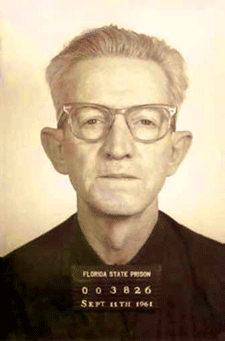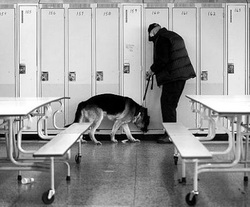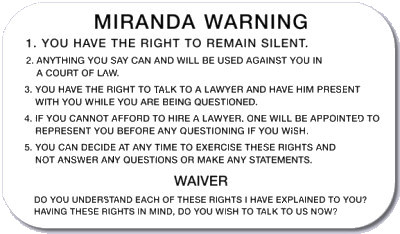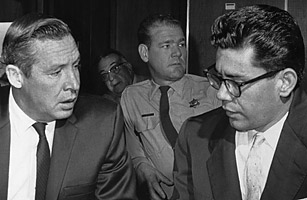Tinker vs Des Moines- December 1965
This case was about students in Des Moines speaking out again the Vietnam war by wearing black armbands with a peace sign on it. The school caught wind of what students were planning to do and they made a policy that stated any student wearing an armband would be asked to remove it, and if the refused they would be suspended. Mary Beth Tinker, John Tinker, and Christopher Eckhardt were students who wore those arm bands to school and refused to remove them and were suspended. The legal issue was that the school suspending those kids and making that policy was violating their first amendment right of freedom of speech.
This case was about students in Des Moines speaking out again the Vietnam war by wearing black armbands with a peace sign on it. The school caught wind of what students were planning to do and they made a policy that stated any student wearing an armband would be asked to remove it, and if the refused they would be suspended. Mary Beth Tinker, John Tinker, and Christopher Eckhardt were students who wore those arm bands to school and refused to remove them and were suspended. The legal issue was that the school suspending those kids and making that policy was violating their first amendment right of freedom of speech.

Gideon vs Wainwright-
On June 3, 1961 someone broke into the harbor pool room in Panama City. Someone took the beer and wine. They smashed the jukebox and took the cigarette out and the money was missing. The police found Gideon and arrested him. When they arrested him they found a lot of change in his pockets and he was carrying a bottle of wine. They charged him with breaking and entering. Gideon was poor he could not afford a lawyer. When he went to court he asked for a lawyer and they said no they would not give him one, he then sent a letter to the supreme court of the United States. When they got the letter they said that they would hear his case . The court is trying to decide if they are going to get rid of this special circumstances rule. If it did so then poor people like Gideon would be given a lawyer if charged with a felony in a state court.
On June 3, 1961 someone broke into the harbor pool room in Panama City. Someone took the beer and wine. They smashed the jukebox and took the cigarette out and the money was missing. The police found Gideon and arrested him. When they arrested him they found a lot of change in his pockets and he was carrying a bottle of wine. They charged him with breaking and entering. Gideon was poor he could not afford a lawyer. When he went to court he asked for a lawyer and they said no they would not give him one, he then sent a letter to the supreme court of the United States. When they got the letter they said that they would hear his case . The court is trying to decide if they are going to get rid of this special circumstances rule. If it did so then poor people like Gideon would be given a lawyer if charged with a felony in a state court.
Miranda vs Arizona-
In the year 1965 the Miranda v. Arizona case was presented to the supreme court that finalized with a result of 5-4. The defendant waived their rights after being given them. In this case the Miranda are the sited rights that an individual has while getting arrested or incremented. The full name for it is the Miranda warning but though the years it has changed into the Miranda rights. These rights are also under the constitution, therefore once the defendant is being interrogated they can invoke them. On march 13, 1963, a guy named Ernesto Miranda was arrested because the police believed that they had evidence that linked him to the rape of a 17 years old women that apparently occurred 10 days before his arrest date. Ernesto signed a confession, before he signed them they didn't read him his rights, such as being able to remain silent or the right to an attorney etc.. He went into courtrooms where his lawyer objected the use of his confession because he didn't believe that it was voluntarily given. The court overruled the confession and Ernesto was looking at around 20-30 years in prison. This was 20-30 years for each one of the charges, not as an overall time period he would get sentenced to. His lawyer filed an appeal to the Arizona Supreme Courts demanding that his confession shouldn't have been used because it wasn't voluntary. The court looked at his case and released that the confection was valid due to the 5th amendment if he was told his rights and choose to waive them.
In the year 1965 the Miranda v. Arizona case was presented to the supreme court that finalized with a result of 5-4. The defendant waived their rights after being given them. In this case the Miranda are the sited rights that an individual has while getting arrested or incremented. The full name for it is the Miranda warning but though the years it has changed into the Miranda rights. These rights are also under the constitution, therefore once the defendant is being interrogated they can invoke them. On march 13, 1963, a guy named Ernesto Miranda was arrested because the police believed that they had evidence that linked him to the rape of a 17 years old women that apparently occurred 10 days before his arrest date. Ernesto signed a confession, before he signed them they didn't read him his rights, such as being able to remain silent or the right to an attorney etc.. He went into courtrooms where his lawyer objected the use of his confession because he didn't believe that it was voluntarily given. The court overruled the confession and Ernesto was looking at around 20-30 years in prison. This was 20-30 years for each one of the charges, not as an overall time period he would get sentenced to. His lawyer filed an appeal to the Arizona Supreme Courts demanding that his confession shouldn't have been used because it wasn't voluntary. The court looked at his case and released that the confection was valid due to the 5th amendment if he was told his rights and choose to waive them.

TLO vs New Jersey-In 1980, a New Jersey a high school student, who was known as T.L.O. was found smoking in the washroom. Smoking was against school rules. When T.L.O was confronted by the assistant principal of the school, name Choplick. T.L.O denied that she was smoking and Choplick decided to search her purse. When Choplick opened T.L.O’s purse, he found cigarettes, rolling papers, marijuana, a pipe, plastic bags, money, and a list of students who owned T.L.O money. T.L.O was taken to the police, where she admitted that she was selling marijuana and charges were brought against her by the State of New Jersey. T.L.O stated that the continued search of her purse violated her rights listed under the 4th amendment of the constitution. The 4th amendment of the constitution government must have a warrant to search and seizure citizens property, must be a reason for a warrant. T.L.O also argued that her confession should not be used against her in court. The court, however, turned down her arguments because the search was done with reasonable suspicion and she smoke cigarettes was against school rules. In 1982, the court found T.L.O guilty and sentenced her to one year of probation. T.L.O also appealed her case to the Supreme Court of New Jersey and found her search unreasonable. The Supreme Court of the United States hear her case in 1983 and the decision was made in 1985. I believe her right was not violated, what if someone saw a gun in someone's purse? Then they would not be able to find the gun and that puts someone's life in danger.



 RSS Feed
RSS Feed